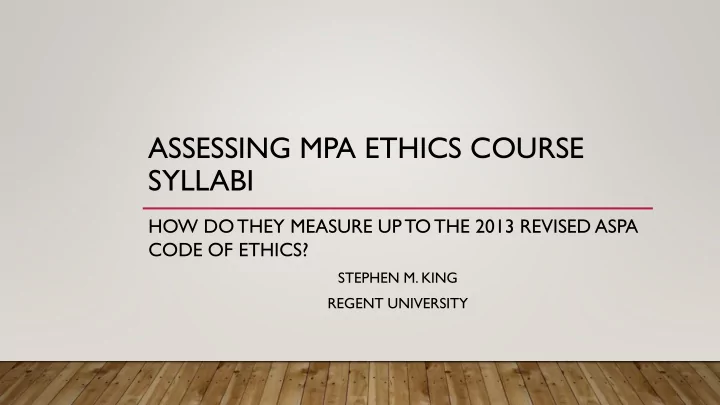

ASSESSING MPA ETHICS COURSE SYLLABI HOW DO THEY MEASURE UP TO THE 2013 REVISED ASPA CODE OF ETHICS? STEPHEN M. KING REGENT UNIVERSITY
PRIMARY FOCUS OF RESEARCH • The paper: • 1) reviews literature on conceptual approaches to public administration ethics and ethics education • 2) assesses whether or how the eight ASPA Code embody fundamental values in public administration; • 3) conducts conceptual content analysis of MPA ethics course syllabi for NASPAA accredited programs in the United States, • 4) focus on determining trends in the content of these courses and to assess if the instruction is consistent with the eight principles in the ASPA Code; and • 5) draws conclusions and implications to inform practice and future research.
METHOD: CONTENT ANALYSIS • Sample • Data Analysis Procedure • Drawn from the list of 179 NASPAA • The 8 principles of the 2013 revised ASPA accredited programs published in 2017. Code served as the main categories for coding syllabi. • A final sample of 99 schools were contacted; • A coding rubric was developed to categorize; 41 stand-alone ethics courses • 1. Course description & learning 58 elective courses • objectives • 30.3% response rate 2. Content (assigned readings, assignments, • 30 schools responded and provided copies and topics) of most current syllabi. • All data analysis conducted in NVIVO qualitative software
DESCRIPTION OF SAMPLE Table 1. Characteristics of Surveyed MPA Programs ( n = 30 ) Items n % Geographic regions Western (CA, CO, ID, NM, OR, TX, WA) 10 33.3 Midwestern (IL, KS, MI, MO) 6 20.0 Southern (FL, GA, KY, NC, TN, SC, VA) 10 33.3 Eastern (MA, NJ, NY) 4 13.3 Course types Explicitly administrative ethics 18 60.0 Administrative ethics related 12 40.0 Status in the curriculum Required 20 66.7 Elective 10 33.3
RESULTS Table 2. Coverage Based on Course Description and Learning Objectives Number of Category frequency Syllabi (%) Advance the Public Interest 37 17 (56.7) Uphold the Constitution and the law 13 5 (16.7) Promote Democratic Participation 13 8 (26.7) Strengthen Social Equity 9 8 (26.7) Fully Inform and Advise 7 6 (20.0) Demonstrate Personal Integrity 52 20 (66.7) Promote Ethical Organizations 71 23 (76.7) Advance Professional Excellence 110 29 (96.7)
RESULTS Table 3. Coverage Based on Content ASPA Code Category T extbooks Journal Articles Course T opic* n (%) f n (%) f n (%) f Advance the Public Interest 21 (70.0%) 40 6 (20.0%) 19 17 (56.7%) 41 Uphold the Constitution and the law 22 (73.3%) 37 9 (30.0%) 19 19 (63.3%) 43 Promote Democratic Participation 19 (63.3%) 27 7 (23.3%) 16 14 (46.7%) 42 Strengthen Social Equity 15 (50.0%) 22 6 (20.0%) 14 12 (40.0%) 23 Fully Inform and Advise 9 (30.0%) 10 2 (6.7%) 3 6 (20.0%) 6 Demonstrate Personal Integrity 30 (100.0%) 77 9 (30.0%) 37 24 (80.0%) 107 Promote Ethical Organizations 29 (96.7%) 85 11(36.7%) 72 28 (93.3%) 181 Advance Professional Excellence 24 (80.0%) 55 9 (30.0%) 22 25 (83.3%) 74 Note : n = 30; f is the frequency to which themes relevant to code categories are referenced across syllabi. *Includes both course topics and relevant assignments
DISCUSSION & CONCLUSION • Four frequently mentioned objectives across the MPA ethics curricula with match to the ASPA Code are to produce graduates committed to: a. Professional excellence in public service b. Ethical organizations c. Personal integrity d. Advancement of the public interest • Course objectives focusing on constitution and law, democratic participation, social equity, and provision of professional policy advice appeared relatively less often both within and across syllabi. • Predominance of the process orientation to the exclusion of the role of morality in public policy. • Relative absence of focus on the tripartite foundation of ethics, deontological, teleological and virtue ethics.
CONCLUSION & IMPLICATIONS • T o varying degrees, MPA ethics courses cover a range of public service values consistent with the framework of values in the ASPA Code of Ethics. • Gap exists between coverage of bureaucratic ethos and democratic ethos. • Codes of ethics provide an important framework for teaching administrative ethics but should be combined with other ethical frameworks. • Additional research is needed to understand why instructors emphasize bureaucratic values more than democratic values.
Recommend
More recommend